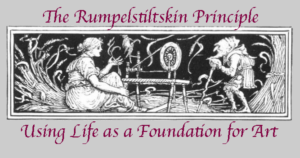 Sales figures make it clear that memoirs are a huge genre today. But that’s not what I want to talk about by saying “using life as a foundation for art.” Poets already know this secret, so let me address myself to novelists. My topic is: don’t neglect to take the straw of your own life and spin it into fictional gold!
Sales figures make it clear that memoirs are a huge genre today. But that’s not what I want to talk about by saying “using life as a foundation for art.” Poets already know this secret, so let me address myself to novelists. My topic is: don’t neglect to take the straw of your own life and spin it into fictional gold!
What does that mean? Well, it can means incorporating in your novel things that have actually befallen you. They are real to you. Even thinking about them invokes the memory of how they felt, joyous or painful. And that’s more valuable to you than simply providing ideas for some episodes of action. Think about the birth of a child—in a novel, a birth could be simply a description of an event. But if it makes you remember the birth of your own first child, it could be filled with the fear, the hope, the pain, the relief, the bodily responses both mother and father experience in different ways. How much more alive… because you’ve been there and can speak with authority!
Don’t overlook the straw
Yet here is the beauty of looking into your real life: you don’t have to limit yourself to the events you’ve experienced. Because the emotions that accompany them are just as powerful and unforgettable and far more useful in a variety of situations. Even if no childbirth occurs in your story, you can recall and harness the emotions you felt in childbirth (or being jilted or receiving a scary diagnosis, etc.) to respond to other events. Someone like me, who writes historical fiction, may never have experienced the fall of her city in a siege or being reduced to slavery (thank heavens!), but I’ve certainly experienced fear, anger, humiliation, pride. All of these remembered emotions can transfer to period-appropriate events in my novels to help infuse them with greater intensity and authenticity.
Spinning can be work
It isn’t always pleasant to recall moments of strong emotion, especially grief or hopelessness or anger. Maybe you’re afraid to dredge up these events from the past, which you’ve managed to bury. But great writing requires fearlessness—and this is certainly at the root of the mania for memoirs. How frequently they are touted as “fearless” or “honest”! Readers crave that. Besides, you may find there’s catharsis in getting those emotions out on the page, distancing them by letting someone else (your fictional personage) undergo them instead of you. And your scenes will be deeply affecting and emotionally true.
24-carat stories
So don’t hold back on the memory, the body memory, even. And don’t try to wiggle out of it by saying you’ve lived an uneventful life! Use your imagination when you have to, but let it be informed by the real—by the real emotional experiences you’ve lived. Your stories will be more intense and more authentic. They’ll be pure emotional gold!

Jon Rose
Nikki,
This has proved helpful to me (for a variety of reasons) . . . mainly because
I began a story of my (young) life years ago, then let it go because it was
too painful, I got tired, I was frustrated, any number of excuses. I quit. Since
then, I have discovered Biographical Fiction (or something of which you
have spoken).
Thanks.
Jon Rose
Niki,
I’ve committed the worst sin–spelled your name wrong. I was thinking
of another Nikki I know. Please excuse me. Everything else is true!
Niki H Kantzios
No problem with the name, Jon. I’m plenty used to it! And I’m glad you found something useful in the blog. That’s why we’re all here–to help each other!
Ruth Coe Chambers
Niki,
Your blog is great, and I’m sure will hit the creative button of many readers. Thinking of my past was the start of my future as a writer. I hope your wisdom will find homes with many readers.